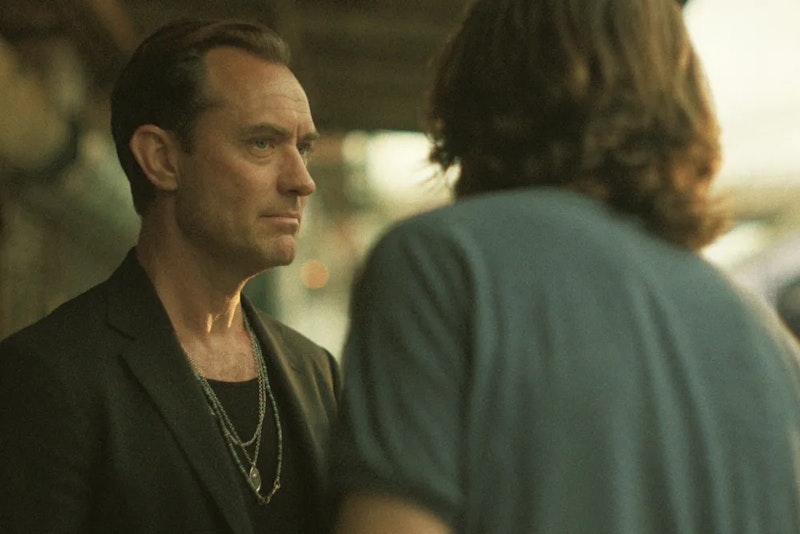The greatest asset that Netflix’s new limited series Black Rabbit has is self-awareness. There’s no attempt to reinvent the wheel, and a few striking visual parallels to New York City crime classics like Mean Streets and Midnight Cowboy suggest that creators Zach Baylin and Kate Susman are aware of their influences; if they were going to steal, why not steal from the best? Even if Black Rabbit does blunder in its attempts to capture the same unrelenting suspense as those masterpieces, the strong duo of lead performances are enough to justify an eight-episode binge.
Despite an opening scene which contained a Tarantino-esque display of ultra violence, Black Rabbit is much more of a workplace drama than a piece of exploitation. At the center of the show is a frictional, “Cain and Able” style relationship between two hotshot brothers determined to sustain an independent business on their own terms in New York. As is often the case with fraternal dramas, the success of one brother is paired with the downfall of the other. Jake Friedkin (Jude Law) is the owner and public face of a prestigious restaurant and lounge, but his brother Vince (Jason Bateman) has fallen in debt to the gangster Joe Mancuso (Troy Kotsur). Since Vince’s contributions were invaluable to the creation of the dining destination, Jake’s inevitably tied up in the criminal machinations.
Flashbacks can be detrimental to a show as kinetic as Black Rabbit, but they’re well deployed to indicate the bitter irony that resulted in Vince’s unfortunate series of predicaments. Jake and Vince are flawed men, willing to take risks, who took a gamble on the idea that a restaurant could be a “nightclub for adults” who wanted a temporary excuse to indulge in luxury. It’s only a matter of fate that their lives took such different paths; Jake’s family crumbled in a way that gave him independence, whereas Vince struggled to connect with his adult daughter, Gen (Odessa Young), after a nasty experience with addiction.
Black Rabbit is elevated above the many Breaking Bad imitators of recent years because it doesn’t abandon its original premise after the first emergence of the mafia. While Jake and Vince may trade intense encounters with Mancuso’s relentless enforcers, they’re still tasked with the maintenance of a restaurant, which has employed a talented staff of ambitious chefs and entrepreneurs. The struggle that the brothers face is how to balance responsibility without yielding control; while Vince may have the “street smarts” needed to make some shady deals, Jake’s fearful of what his brother would do if given more responsibility. Even if they’re working together out of necessity, being in such close proximity is a reminder to Jake and Vince of the petty feuds and personal insults that dominated their lifetime together.
Black Rabbit is hardly a commentary on the social clout of New York’s dining scene, but there’s enough specificity within the portrayal of hospitality to suggest that Baylin and Susman did their research; if anything, the recent popularity of The Bear indicated that viewers are interested in the paranoid mania that goes into meals of grandeur. There’s a balancing act required to make both characters equally sympathetic, but Black Rabbit is able to show sympathy for both parties while never being overtly saccharine.
Law’s the rare Hollywood star who’s grown more interesting later in his career because of his willingness to step outside the familiarity of leading man roles. It’s thanks to his chameleonic transformation into a prickly expatriate in The Third Day, a creepy music manager in Vox Lux, a duplicitous trader in The Nest, and a sociable cardinal in The Young Pope that his performance as Jake is more dynamic than it would’ve been with a less seasoned actor. Jake’s magnetism is undefinable, but the mysterious showmanship poured into the restaurant has created a trance-like experience for his clients; most of his guests are willing to be transported by Jake for an evening, but wouldn’t want to think too hard about the roads their host travelled.
Bateman’s greatest contributions to the show are behind-the-scenes, even if his performance has an endearingly unpredictable energy. Although Bateman was perhaps a bit too sarcastic and self-deprecating to make it as a traditional leading man in the wake of the critical acclaim of Arrested Development, he transformed into one of the most consistent auteurs in prestige television. Ozark, a series Bateman willed into existence as a creative developer and star, succeeded thanks to a strange blend of elegant filmmaking and shock. Black Rabbit is geared towards the same audience; it’s hard not to get swept up in the labyrinth of crime and consequence that has kept the series so propulsive.

